Papers by Wilson lopez-lopez
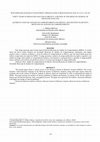
RESUMO Este artigo apresenta uma revisão atual da Revista Mexicana de Análise do Comportamento (M... more RESUMO Este artigo apresenta uma revisão atual da Revista Mexicana de Análise do Comportamento (MJBA). A revisão inclui um breve resumo histórico da Sociedade Mexicana de Análise do Comportamento, juntamente com alguns aspectos sobre o contexto acadêmico e social da análise do comportamento no México, que são mencionados para uma melhor compreensão da origem do MJBA. O artigo apresenta o número de artigos publicados em inglês e espanhol e um análise de artigos relacionados ao comportamento humano e não humano e à pesquisa básica e aplicada. O artigo também relata a afiliação universitária dos primeiros autores com maior porcentagem de artigos publicados. Palavras-chave: análise do comportamento no México, ABSTRACT The present paper shows a current review of the Mexican Journal of Behavior Analysis (MJBA). The review includes a brief historical summary of the Mexican Society of Behavior Analysis, along with some aspects about the academic and social context of behavior analysis in Mexico which are mentioned in order to understand the origin of MJBA. The paper presents the number of articles published in English and Spanish, an analysis of the articles related to human and non-human behavior, basic and applied research. The paper also reports the first authors' university affiliation with higher percentage of articles published.
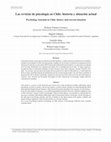
Resumen El presente artículo expone una revisión del desarrollo histórico y estado actual de las ... more Resumen El presente artículo expone una revisión del desarrollo histórico y estado actual de las publicaciones científicas seriadas en psicología en Chile. Para determinar el análisis de las revistas se realizó una recuperación de las mismas por medio de su solicitud de ISSN (International Standard Serial Number), lo cual arrojó un resultado de 39 revistas clasificadas en la categoría psicología. De la cantidad total de revistas, 14 siguen vigentes y la mitad de ellas se encuentran indizadas en bases de datos como Web of Science, Scopus, SciELO y Re-dalyc. Se concluye que una mayor preocupación por potenciar los índices bibliométricos y cienciométricos de las revistas, permitirá mejorar las indizaciones de las revistas de psicología y de esta forma contribuir al mejoramiento de la calidad, visibilidad e impacto de estas tanto en Chile como en el resto de Latinoamérica. Abstract This article is a review of the historical and current state of the periodical scientific publications about psychology in Chile. In order to choose the journals, a search of these journals was made through the ISSN (International Standard Serial Number), which found 39 journals classified in the category of " psychology ". From the total number of journals, 14 are still being published and half of them are indexed in databases such as Web of Science, Scopus, SciELO and Redalyc. Based on this analysis, it is possible to conclude that it is necessary to promote and enhance bibliometric and scienciometric indexes of journals, which will improve the indexing of psychology journals, and thus contribute to the improvement of the quality, visibility and impact of these magazines, both in Chile and the rest of Latin America.
Avances En Psicologia Latinoamericana, 2010
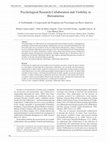
The phenomenon of collaboration is an increasing trend in many fields of science, including that ... more The phenomenon of collaboration is an increasing trend in many fields of science, including that of psychology. In Iberoamerican psychology, collaboration occurs on a local and international level. The aim of the study was to evaluate the levels of collaboration in Iberoamerica, using as a baseline the level of worldwide collaboration in psychology in 2012. We collected data from the Scopus database and analyzed it by cluster distribution. Analysis of the sample found within-country collaboration prominent among Iberoamerican psychologists. Findings indicated that in Iberoamerica there is significantly less global collaboration than in other regions, although Iberoamerican scientists are receptive to the idea and acknowledge its potential. Resumo O fenômeno da colaboração é uma tendência em crescimento em muitos campos da ciência, incluin-do a psicologia. Na psicologia ibero-americana a colaboração vem ocorrendo em nível regional e internacional. O objetivo deste estudo foi avaliar níveis de colaboração em Ibero-América, usando como linha de base o nível de colaboração mundial em psicologia nos anos de 2012. Os dados foram coletados da base Scopus e analisado pela distribuição de dados segundo seu grau de agrupamento (cluster). A análise mostrou que a colaboração entre ibero-americanos é maior dentro dos respecti-vos países e menor em nível global. Mesmo assim, destaque-se que cientistas ibero-americanos são receptivos a ideia de internacionalização e reconheçam seu potencial.
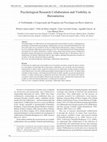
The phenomenon of collaboration is an increasing trend in many fields of science, including that ... more The phenomenon of collaboration is an increasing trend in many fields of science, including that of psychology. In Iberoamerican psychology, collaboration occurs on a local and international level. The aim of the study was to evaluate the levels of collaboration in Iberoamerica, using as a baseline the level of worldwide collaboration in psychology in 2012. We collected data from the Scopus database and analyzed it by cluster distribution. Analysis of the sample found within-country collaboration prominent among Iberoamerican psychologists. Findings indicated that in Iberoamerica there is significantly less global collaboration than in other regions, although Iberoamerican scientists are receptive to the idea and acknowledge its potential. Resumo O fenômeno da colaboração é uma tendência em crescimento em muitos campos da ciência, incluin-do a psicologia. Na psicologia ibero-americana a colaboração vem ocorrendo em nível regional e internacional. O objetivo deste estudo foi avaliar níveis de colaboração em Ibero-América, usando como linha de base o nível de colaboração mundial em psicologia nos anos de 2012. Os dados foram coletados da base Scopus e analisado pela distribuição de dados segundo seu grau de agrupamento (cluster). A análise mostrou que a colaboração entre ibero-americanos é maior dentro dos respecti-vos países e menor em nível global. Mesmo assim, destaque-se que cientistas ibero-americanos são receptivos a ideia de internacionalização e reconheçam seu potencial.
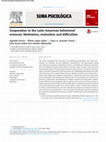
This study investigated the motivation for establishing partnerships, how these partnerships
are ... more This study investigated the motivation for establishing partnerships, how these partnerships
are evaluated, and the difficulties encountered in the partnerships among
Latin-American researchers in behavioral sciences. A hundred Latin-American researchers
who had published scientific work indexed in Psycinfo in which another author from the
continent participated. The participants answered a questionnaire on the above-mentioned
topics. The results indicated that the main reasons for establishing partnerships with other
Latin-Americans were to seek broader and more significant results and increased productivity
or the visibility and recognition of production. As regards the evaluation of the results
of the partnership, most participants indicated that the partnership has resulted in an
increase in publications and publications of higher scientific level and greater visibility.
Several difficulties were recognized, which in general, were access and communication in
order to maintain the partnership. The main difficulties in conducting research were related
to the final writing of the paper, as an article, chapter or other, as well as data collection.
In terms of work infrastructure, the main barriers were financial constraints and lack of
time to devote to the partnership. It can be concluded that the main reasons to cooperate
are qualitative and quantitative advances, and that the difficulties in the partnerships are
secondary
This study aimed to understand the meanings attributed to forgive and to ask for forgiveness, the... more This study aimed to understand the meanings attributed to forgive and to ask for forgiveness, the conditions that facilitate and prevent to ask for forgiveness and the consequences obtained from this process in the middle of the armed conflict in Colombia. The research was developed from a qualitative perspective using the method of Grounded Theory, and was done with the participation of 40 men and women between the ages of 20 and 40. Forgiveness was defined as a process
of forgetting or understanding of the damage in order to restore the relationship. Asking for forgiveness was described as a process of liberation and repair. The main consequences obtained are
personal healing, reconciliation and replacing negative emotions with positive ones.
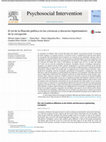
Corruption is defined as the abuse of power in order to obtain personal benefit. Central and Sout... more Corruption is defined as the abuse of power in order to obtain personal benefit. Central and South America, with the exception of Chile, Uruguay and the French Guiana, show high rates of corruption. This study sought to find the meanings that ordinary people attach to corruption as well as the relationship between their narratives and sociodemographic characteristics, such as sex and educational level, and political standpoints, such as their political party affiliation. A total of 325 people participated, 166 females aged 18-69 (M=35.58, SD=13.44) and 159 males aged 19-74 (M=36.09, SD=13.02). All education levels (primary, secondary, technical, university, postgraduate and none) were represented in the sample. Narratives were analysed via uni- and multidimensional methods and using the SPAD software programme. Variables used for the analysis were: meaning of corruption, corruption cases, seriousness of corruption (textual), and sex, educational level, socioeconomic level, political party affiliation (categorical). The primary results suggested that the meanings and definitions of corruption frequently feature the following verbs: to benefit, power, to obtain, to take advantage of, to steal, to bribe, and to threaten. Participants also mentioned acts of corruption that they learned about via mass media, and that involved the participation of government agents and large amounts of money. A third result was evidence that sociodemographic characteristics such as sex and education level are closely related with perceptions of what is and is not corrupt. Likewise, identification with a political party influences the judgments made on acts of corruption by both the opposing group and the group to which participants belong. We first discuss the gender difference in terms of the facts and meanings of corruption, and then we discuss how the facts of corruption (big and small) are perceived as serious or not depending on the education level of the citizens. Finally, we discuss how the attitudes and judgements expressed regarding an illegal act are considered more or less corrupt depending on the social or political group with which the citizens identify.

Objective. In this study, the implicit attitudes of University students were analyzed with regard... more Objective. In this study, the implicit attitudes of University students were analyzed with regard to forgivingness
towards ex members of the guerilla and paramilitary groups in the Colombian armed conflict. Method. Thirty
University students in Bogotá were measured with the IAT (Implicit Association Test) by using the response
latency to measure the strength of the association between different concepts and an explicit questionnaire
related to forgiveness. The analysis was made from functional contextualism and Relational Frame Theory.
Results. There was found that participants presented a stronger association between the concepts of forgiveness
and Guerilla, suggesting they would be more willing to forgive an ex member of this armed group. Conclusion. This investigation opens the possibility of further exploration on the subject of forgiveness in a post conflict
scenario, including variables such as political position, age, and war experiences from a contemporary
perspective.
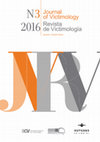
Victims of socio-political violence must not only face dispossession and material damages, but al... more Victims of socio-political violence must not only face dispossession and material damages, but also health effects. Only in Colombia, there are 7.675.032 victims who have experienced forced disappearance, sexual violence, forced recruitment, anti-personnel mines, massacres, murders, and kidnappings. These events have led to emotional, psychological, moral, political, and cultural damages. Forgiveness and
reconciliation are some of the strategies we deem fundamental in order to intervention, and contribute to, psychological well-being, and in fact a positive effect of them for both victims and offenders has already been documented. Thus, the goal of this paper was to conduct a review of the main publications in Scopus, Web of Knowledge, APA PsycArticles and SciELO, dealing with seeking of forgiveness, health, anxiety,
Post-Traumatic Stress Disorder and victims. From the resulting papers, we selected only those relating forgiveness and socio-political violence. Reports from Colombian institutions and newspaper clips were also considered. In the reviewed publications, three topic groups were identified: implications of violent events on mental health; forgiveness and reconciliation as strategies to improve the psychological well-being of victims; and finally, programs or strategies of intervention on the victims’ psychological suffering, with forgiveness and reconciliation
as strategies. The main conclusions are that forgiveness is a strategy that can be learned and that can mobilize emotional and social processes toward well-being; that more attention to a gender perspective is needed in psychosocial interventions; that
more detailed knowledge of how reconciliation processes work and are managed; and that Social Sciences need to base their interventions on scientific knowledge, sharing perspectives such as that of transformative justice.
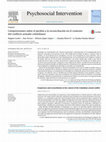
El perdón y la reconciliación son 2 factores importantes y determinantes en la transformación de ... more El perdón y la reconciliación son 2 factores importantes y determinantes en la transformación de las
prácticas culturales en los procesos de paz. Este estudio buscó indagar las ideas y creencias sobre el
perdón y la reconciliación de los colombianos. Esta fue una investigación de corte cualitativo, que se
desarrolló usando el método de la teoría fundamentada, con la participación de 45 hombres y mujeres
de edades entre los 18 y los 65 anos, ˜ pertenecientes a las clases sociales baja, media y alta. Para la
recolección de los datos se utilizó una entrevista semiestructurada. De acuerdo con el análisis de las
narrativas de los participantes, emergieron como categorías de análisis: las definiciones del perdón, los
factores que facilitan el perdón, las definiciones de la reconciliación, las condiciones para la reconciliación
y las competencias ciudadanas involucradas en el perdón y la reconciliación.
Dentro de los principales hallazgos se observaron opiniones en las que se definía el perdón como un
proceso de reemplazo de las emociones negativas hacia un agresor por emociones positivas y también
como olvido del agravio. La reconciliación es entendida en el sentido del reinicio de las interacciones con
el agresor y en diversos casos se consideró que no había ninguna diferencia entre perdonar y reconciliarse.
Tanto para perdonar como para reconciliarse, los participantes hicieron mención a la necesidad
del diálogo, también al compromiso de no repetición de la ofensa, y en otros casos, a la exigencia de que
los ofensores experimenten una consecuencia por sus agravios
Comprensiones sobre el perdón y la reconciliación en el contexto del conflicto armado colombiano ... more Comprensiones sobre el perdón y la reconciliación en el contexto del conflicto armado colombiano información del artículo Historia del artículo: Recibido el 6 de agosto de 2015 Aceptado el 25 de septiembre de 2015 On-line el 8 de diciembre de 2015 Palabras clave: Perdón Reconciliación Conflicto armado Competencias ciudadanas

A few studies conducted in France, Latin America, China and Sub-Saharan Africa have examined the ... more A few studies conducted in France, Latin America, China and Sub-Saharan Africa have examined the extent to which specific behaviors by politicians, state officials, professionals or simple citizens were considered by the public either as corrupt/intolerable or acceptable/tolerable. These studies have shown a great diversity of positions among participants, ranging from ''zero tolerability'' to ''non-zero tolerability'', to high tolerance to favoritism, and to complete tolerability. The present study analyzed Colombian lay persons' views as a function of three separate factors characterizing acts of corruption: (a) the current status or position in society of the person who behaved in a corrupt way (politician, judge, entrepreneur or ordinary citizen), (b) the motive behind the act of corruption (nepotism or monetary gain), and (c) the means used for obtaining the under-served benefit (threatening the person, bribery or illicitly sharing of confidential information). As expected, four qualitatively different perspectives were identified. The first one (60 % of the participants) was the expected Zero Tolerance view because all acceptability ratings were extremely low. The second one (32 %) was called Never Very Tolerable because ratings, although always low, varied as a function of the means used: Threat and bribery were considered as more intolerable than use of information. The third one (7 %) was called Depends on Means because the ratings were affected by the means used to a larger extent than in the preceding case. The fourth one (1 %) was called Always Tolerable because in all cases, the ratings were high. In no cases did acceptability depend much on the status of the person performing the corrupt act or of the motives behind the act. Although only a small minority of participants agreed with the last two views, it is probably enough to create a climate of suspicion in the country.
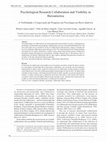
The phenomenon of collaboration is an increasing trend in many fields of science, including that ... more The phenomenon of collaboration is an increasing trend in many fields of science, including that of psychology. In Iberoamerican psychology, collaboration occurs on a local and international level. The aim of the study was to evaluate the levels of collaboration in Iberoamerica, using as a baseline the level of worldwide collaboration in psychology in 2012. We collected data from the Scopus database and analyzed it by cluster distribution. Analysis of the sample found within-country collaboration prominent among Iberoamerican psychologists. Findings indicated that in Iberoamerica there is significantly less global collaboration than in other regions, although Iberoamerican scientists are receptive to the idea and acknowledge its potential. Resumo O fenômeno da colaboração é uma tendência em crescimento em muitos campos da ciência, incluin-do a psicologia. Na psicologia ibero-americana a colaboração vem ocorrendo em nível regional e internacional. O objetivo deste estudo foi avaliar níveis de colaboração em Ibero-América, usando como linha de base o nível de colaboração mundial em psicologia nos anos de 2012. Os dados foram coletados da base Scopus e analisado pela distribuição de dados segundo seu grau de agrupamento (cluster). A análise mostrou que a colaboração entre ibero-americanos é maior dentro dos respecti-vos países e menor em nível global. Mesmo assim, destaque-se que cientistas ibero-americanos são receptivos a ideia de internacionalização e reconheçam seu potencial.
Terapia Psicologica
de Psicología Clínica ISSN 0716-6184 (impresa) · ISSN 0718-4808 (en línea) TERAPIA PSICOLÓGICA 20... more de Psicología Clínica ISSN 0716-6184 (impresa) · ISSN 0718-4808 (en línea) TERAPIA PSICOLÓGICA 2011, Vol. 29, Nº 2, 225-231 Abstract Because of the terrorist attacks occurred in Norway on July 22, 2011, this article reviews some critical points of the phenomenon of terrorism. They have risen from socialand clinical psychology.From the two disciplines of psychology they have been identied as socio-structural, psychosocial and individual, risk factors. However, in cases such as of Norway, there is a clear demandto the understanding and explanation of violent actions viewed from diverse areas (macro and individual levels) butat the same time complementary topsychology. That can contribute to prevent and/or detect potential attacks to destabilize or manipulate social behavior by using extreme and violent acts thatinfringe fundamental human rights.

Psicologica
A pilot study examined lay people’s willingness to forgive acts that were committed by actors of ... more A pilot study examined lay people’s willingness to forgive acts that were committed by actors of the armed conflicts in Colombia. The participants (100 persons living in Bogota) were shown vignettes describing cases in which a member of the guerilla or a member of the former paramilitary forces asks for forgiveness to a victim’s family, and were instructed to judge of the degree to which they would be willing to forgive if they were a family member. The concrete cases were constructed using a 3 x 3 x 3 orthogonal design: Degree of Responsibility x Severity of the Negative Acts Committed x Apologies. In half of the cases, the actor was a former member of the guerilla, whereas in the other half the actor was a former member of the paramilitary forces. The four factors had an impact on willingness to forgive, and several meaningful interactions were detected. Overall, a former member of the paramilitary forces has a reasonable chance of being forgiven (a) if he did not directly take pa...

This article constitutes an anthology of the research in the Department of Psychology of the Univ... more This article constitutes an anthology of the research in the Department of Psychology of the UniversidadJaveriana and it takes as point of consultations the book Saber, sujeto y sociedad: Una década de investigación enPsicología published in the year 2006 by the Editorial Pontificia Universidad Javeriana as a collective work;it shows the research itinerary of the groups and authors which have worked in multiple problematicnucleus like the affective bonds in terms of emotional security and care, the psychological welfare as axleof the psychology of the health, the meanings and bonds to build cultures of peace, the public opinionthat mobilizes different senses in the world, the culture of the transport, the subjetivation and the speechthat mean to the work, the experimented body in the woman, the kidnapping and their ghost of thedeath, the family as a person networks linked by the language, person, relationships and psychic operation,quality of life, numeric thought, experimental psyc...
Diversitas, 2007
revelo en primer lugar la relación entre la Psicología social y la Psicología organizacional; en ... more revelo en primer lugar la relación entre la Psicología social y la Psicología organizacional; en segundo lugar se evidenciaron dos periodos donde las temáticas giran en torno a una visión clásica de la psicologia organizacional y en últimos 10 años un énfasis en una perspectiva critica de la psicologia de las organizaciones.
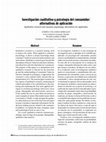
Qualitative research is a research strategy used to analyze the reality. When applied to consumer... more Qualitative research is a research strategy used to analyze the reality. When applied to consumer psychology, it allows a deeper knowledge about consumer's behavior and associated emotions and motivations. Qualitative research goes beyond the description of buyers' behavior and shows information about how and why that behavior is produced. The purpose of this paper is to demonstrate how qualitative research is relevant for the knowledge and the understanding of consumers' behavior and how, through its techniques, it approaches the consumer's socio-cultural reality and provides an interpretation of it. The present paper resumes the key aspects of qualitative research, mentioning its related antecedents of its contributions to the marketing and explaining the four most applied techniques in consumer psychology (interviews, focus group, ethnography and observation); moreover, it also studies the way to carry them out and gives some examples of some of the market issues which it can analyze. Finally, we take up again the qualitative data analysis as one of the most relevant topics because it produces important information for the decision making process related to the consumer. In addition, we explain the steps, strategies, types and technological tools to carry it out.
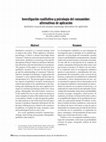
Avances en Psicologia Latinoamericana
Qualitative research is a research strategy used to analyze the reality. When applied to consumer... more Qualitative research is a research strategy used to analyze the reality. When applied to consumer psychology, it allows a deeper knowledge about consumer's behavior and associated emotions and motivations. Qualitative research goes beyond the description of buyers' behavior and shows information about how and why that behavior is produced. The purpose of this paper is to demonstrate how qualitative research is relevant for the knowledge and the understanding of consumers' behavior and how, through its techniques, it approaches the consumer's socio-cultural reality and provides an interpretation of it. The present paper resumes the key aspects of qualitative research, mentioning its related antecedents of its contributions to the marketing and explaining the four most applied techniques in consumer psychology (interviews, focus group, ethnography and observation); moreover, it also studies the way to carry them out and gives some examples of some of the market issues ...







Uploads
Papers by Wilson lopez-lopez
are evaluated, and the difficulties encountered in the partnerships among
Latin-American researchers in behavioral sciences. A hundred Latin-American researchers
who had published scientific work indexed in Psycinfo in which another author from the
continent participated. The participants answered a questionnaire on the above-mentioned
topics. The results indicated that the main reasons for establishing partnerships with other
Latin-Americans were to seek broader and more significant results and increased productivity
or the visibility and recognition of production. As regards the evaluation of the results
of the partnership, most participants indicated that the partnership has resulted in an
increase in publications and publications of higher scientific level and greater visibility.
Several difficulties were recognized, which in general, were access and communication in
order to maintain the partnership. The main difficulties in conducting research were related
to the final writing of the paper, as an article, chapter or other, as well as data collection.
In terms of work infrastructure, the main barriers were financial constraints and lack of
time to devote to the partnership. It can be concluded that the main reasons to cooperate
are qualitative and quantitative advances, and that the difficulties in the partnerships are
secondary
of forgetting or understanding of the damage in order to restore the relationship. Asking for forgiveness was described as a process of liberation and repair. The main consequences obtained are
personal healing, reconciliation and replacing negative emotions with positive ones.
towards ex members of the guerilla and paramilitary groups in the Colombian armed conflict. Method. Thirty
University students in Bogotá were measured with the IAT (Implicit Association Test) by using the response
latency to measure the strength of the association between different concepts and an explicit questionnaire
related to forgiveness. The analysis was made from functional contextualism and Relational Frame Theory.
Results. There was found that participants presented a stronger association between the concepts of forgiveness
and Guerilla, suggesting they would be more willing to forgive an ex member of this armed group. Conclusion. This investigation opens the possibility of further exploration on the subject of forgiveness in a post conflict
scenario, including variables such as political position, age, and war experiences from a contemporary
perspective.
reconciliation are some of the strategies we deem fundamental in order to intervention, and contribute to, psychological well-being, and in fact a positive effect of them for both victims and offenders has already been documented. Thus, the goal of this paper was to conduct a review of the main publications in Scopus, Web of Knowledge, APA PsycArticles and SciELO, dealing with seeking of forgiveness, health, anxiety,
Post-Traumatic Stress Disorder and victims. From the resulting papers, we selected only those relating forgiveness and socio-political violence. Reports from Colombian institutions and newspaper clips were also considered. In the reviewed publications, three topic groups were identified: implications of violent events on mental health; forgiveness and reconciliation as strategies to improve the psychological well-being of victims; and finally, programs or strategies of intervention on the victims’ psychological suffering, with forgiveness and reconciliation
as strategies. The main conclusions are that forgiveness is a strategy that can be learned and that can mobilize emotional and social processes toward well-being; that more attention to a gender perspective is needed in psychosocial interventions; that
more detailed knowledge of how reconciliation processes work and are managed; and that Social Sciences need to base their interventions on scientific knowledge, sharing perspectives such as that of transformative justice.
prácticas culturales en los procesos de paz. Este estudio buscó indagar las ideas y creencias sobre el
perdón y la reconciliación de los colombianos. Esta fue una investigación de corte cualitativo, que se
desarrolló usando el método de la teoría fundamentada, con la participación de 45 hombres y mujeres
de edades entre los 18 y los 65 anos, ˜ pertenecientes a las clases sociales baja, media y alta. Para la
recolección de los datos se utilizó una entrevista semiestructurada. De acuerdo con el análisis de las
narrativas de los participantes, emergieron como categorías de análisis: las definiciones del perdón, los
factores que facilitan el perdón, las definiciones de la reconciliación, las condiciones para la reconciliación
y las competencias ciudadanas involucradas en el perdón y la reconciliación.
Dentro de los principales hallazgos se observaron opiniones en las que se definía el perdón como un
proceso de reemplazo de las emociones negativas hacia un agresor por emociones positivas y también
como olvido del agravio. La reconciliación es entendida en el sentido del reinicio de las interacciones con
el agresor y en diversos casos se consideró que no había ninguna diferencia entre perdonar y reconciliarse.
Tanto para perdonar como para reconciliarse, los participantes hicieron mención a la necesidad
del diálogo, también al compromiso de no repetición de la ofensa, y en otros casos, a la exigencia de que
los ofensores experimenten una consecuencia por sus agravios
are evaluated, and the difficulties encountered in the partnerships among
Latin-American researchers in behavioral sciences. A hundred Latin-American researchers
who had published scientific work indexed in Psycinfo in which another author from the
continent participated. The participants answered a questionnaire on the above-mentioned
topics. The results indicated that the main reasons for establishing partnerships with other
Latin-Americans were to seek broader and more significant results and increased productivity
or the visibility and recognition of production. As regards the evaluation of the results
of the partnership, most participants indicated that the partnership has resulted in an
increase in publications and publications of higher scientific level and greater visibility.
Several difficulties were recognized, which in general, were access and communication in
order to maintain the partnership. The main difficulties in conducting research were related
to the final writing of the paper, as an article, chapter or other, as well as data collection.
In terms of work infrastructure, the main barriers were financial constraints and lack of
time to devote to the partnership. It can be concluded that the main reasons to cooperate
are qualitative and quantitative advances, and that the difficulties in the partnerships are
secondary
of forgetting or understanding of the damage in order to restore the relationship. Asking for forgiveness was described as a process of liberation and repair. The main consequences obtained are
personal healing, reconciliation and replacing negative emotions with positive ones.
towards ex members of the guerilla and paramilitary groups in the Colombian armed conflict. Method. Thirty
University students in Bogotá were measured with the IAT (Implicit Association Test) by using the response
latency to measure the strength of the association between different concepts and an explicit questionnaire
related to forgiveness. The analysis was made from functional contextualism and Relational Frame Theory.
Results. There was found that participants presented a stronger association between the concepts of forgiveness
and Guerilla, suggesting they would be more willing to forgive an ex member of this armed group. Conclusion. This investigation opens the possibility of further exploration on the subject of forgiveness in a post conflict
scenario, including variables such as political position, age, and war experiences from a contemporary
perspective.
reconciliation are some of the strategies we deem fundamental in order to intervention, and contribute to, psychological well-being, and in fact a positive effect of them for both victims and offenders has already been documented. Thus, the goal of this paper was to conduct a review of the main publications in Scopus, Web of Knowledge, APA PsycArticles and SciELO, dealing with seeking of forgiveness, health, anxiety,
Post-Traumatic Stress Disorder and victims. From the resulting papers, we selected only those relating forgiveness and socio-political violence. Reports from Colombian institutions and newspaper clips were also considered. In the reviewed publications, three topic groups were identified: implications of violent events on mental health; forgiveness and reconciliation as strategies to improve the psychological well-being of victims; and finally, programs or strategies of intervention on the victims’ psychological suffering, with forgiveness and reconciliation
as strategies. The main conclusions are that forgiveness is a strategy that can be learned and that can mobilize emotional and social processes toward well-being; that more attention to a gender perspective is needed in psychosocial interventions; that
more detailed knowledge of how reconciliation processes work and are managed; and that Social Sciences need to base their interventions on scientific knowledge, sharing perspectives such as that of transformative justice.
prácticas culturales en los procesos de paz. Este estudio buscó indagar las ideas y creencias sobre el
perdón y la reconciliación de los colombianos. Esta fue una investigación de corte cualitativo, que se
desarrolló usando el método de la teoría fundamentada, con la participación de 45 hombres y mujeres
de edades entre los 18 y los 65 anos, ˜ pertenecientes a las clases sociales baja, media y alta. Para la
recolección de los datos se utilizó una entrevista semiestructurada. De acuerdo con el análisis de las
narrativas de los participantes, emergieron como categorías de análisis: las definiciones del perdón, los
factores que facilitan el perdón, las definiciones de la reconciliación, las condiciones para la reconciliación
y las competencias ciudadanas involucradas en el perdón y la reconciliación.
Dentro de los principales hallazgos se observaron opiniones en las que se definía el perdón como un
proceso de reemplazo de las emociones negativas hacia un agresor por emociones positivas y también
como olvido del agravio. La reconciliación es entendida en el sentido del reinicio de las interacciones con
el agresor y en diversos casos se consideró que no había ninguna diferencia entre perdonar y reconciliarse.
Tanto para perdonar como para reconciliarse, los participantes hicieron mención a la necesidad
del diálogo, también al compromiso de no repetición de la ofensa, y en otros casos, a la exigencia de que
los ofensores experimenten una consecuencia por sus agravios
(2015), scientific output in Psychology in Iberoamerica,
especially in Latin America, is still marginal
and lacks the impact that could be expected from
the amount of effort and investment put into its
creation. This takes into account the increase in collaboration
and the overcoming of physical barriers
for collaboration (López-López, de Moya Anegón,
Acevedo-Triana, Garcia, & Silva, 2015).
I will focus this editorial on what Open Access (OA) is not. Suber (2015) states the following: 1) It is not an attempt to avoid peer review; a part of our communities, especially in the human and social sciences, often equate OA with avoidance of peer-review and confound the common practice of not paying reviewers to review with lack of peer-review. Statements in OA publications certainly promote peer-reviewing processes. 2) OA does not try to change or refuse exploitation rights; open access uses works in the public domain with the consent of the holder of their rights. 3) OA is not an attempt to suppress the benefits from publication royalties; what it does is to point out that benefits from open access are probably higher than those of not earning royalties at all. 4) OA does not deny that there are associated costs, but it does suggest that alternatives to charging readers need to be found. 5) OA does not seek to end copyright; quite the contrary, it aims to acknowledge them. 6) OA is an attempt to end academic freedom; no, researchers are free to submit their products anywhere. 7) OA is not promoting plagiarism or disrupting anti-plagiarism; every OA policy promotes acknowledgment of authorship and in fact actions oriented towards the identification, regulation and punishment of plagiarism have led to the creation of entities such as COPE (Committee on Publication Ethics ) (López-López, 2014; Yong, Ledford, & Van Noorden, 2013). 8) OA is not an attack on traditional publishing houses; in fact, OA is a vehicle for promoting the work of researchers and institutions. 9) OA does not go against other editorial strategies or editors who do not share OA policies. 10) OA’s goal is not to force catering to non-academic audiences; open access seeks to facilitate a connection between researchers and the rest of academia, by trying to make knowledge available to anyone with Internet access. 11) OA does not imply universal access, since it cannot, by itself, control content filters put in place by entities and governments; it cannot avoid barriers imposed by language, disability or connectivity.
I would also add a couple of additional misunderstandings. 12) OA does not promote the use of published output metrics such as citation analysis (SciELO), downloads and collaborations (Redalyc), or proprietary citation algorithms (Web of Science or Scopus). And finally, 13) OA does not promote the exclusion of publications from indexing systems.
Suber’s book is very relevant, and needs to be consulted by editors, researchers and knowledge managers, since it clarifies the scope and limitations of open access.
It is worth mentioning that this piece is a response to Jeffrey Beall’s unfortunate characterization of OA, SciELO and Redalyc as “favelas”, poorly grounded in reality. We share the views of many actors and entities who voiced their criticisms to those opinions. We believe that our systems have been a rigorous, viable, and sustainable alternative to inadequate practices centered in the commercialization of content. We have learned to live alongside private publishing houses, their metrics and regulations, but we agree that their model has certain flaws and that it does not represent the situation of scientific dissemination in Latin America and in other developing countries (Alperin et al., 2015).
2015), Suber’s (2015) book is a significant
contribution that we can use to clarify the limits
and the scope of Open Access (OA), and it is also
helpful in explaining confusions and inaccuracies
that are widespread in our communities, which are
not quite ready to face the accelerated changes that
are being generated by the new dynamics of scientific
output and communication (Gallegos, Berra,
Benito, & López-López, 2014)
origins, dynamics and trends” [“La Universidad estudios
sobre sus orígenes Dinámicas y tendencias”],
Borrero (2008) states that interdisciplinariety can
be understood in two semantic sets. On the one
hand, it refers to a set of specific attributes that
permit an account of the relationships between
sciences and disciplines; on the other, it is the relationship
between disciplines and the distinction
with everything that is mono-disciplinar (Borrero,
2008). As such, the multidisciplinary (juxtaposition
of disciplines) implies a set of assertions of epistemological
plurality, discontinuity, relative autonomy,
theoretical integration, epistemological affinities,
and in the end it is an imperative “stemming from
the evolution of science itself” (Borrero, 2008, p.
267). Recently, Uribe-Mallarino (2012) in her book
entitled “Interdisciplinariety in today’s university:
reflections and case studies” [“La Interdisciplinariedad
en la Universidad Contemporánea: reflexiones
y estudios de caso”], affirms that interdisciplinariety
is internationally defined around concepts such as
collaboration, hybridation, complexity, integration,
transversality, and problem solving.
frequency with which reports, complaints, and
other discussions about the authorship of articles
or the unrecognized use of document contents by
other authors (practice known as plagiarism), are
being recoded. Although this is not a new topic nor
restricted to the non-recognition of an idea, the problems
associated with the improper use (ethical) of
information are being increasingly discussed. For
instance, topics of discussion are: problems in the
collection, use, careless analysis or discussion of
data with misconduct or falsification (fraud), and
undeserved authorship or duplication of work,
or parts thereof, by the same authors in scientific
publications.
As discussed
los procesos sociales y en especial en las sociedades
en las que la ges1ón de los conflictos ha sido violenta,
por cuanto ésta visible u oculta, parcial, recreada o
narrada por las víc1mas o por quienes han hecho
daño, puesta en la opinión por los medios de
comunicación con sus diferentes intereses o contada
y transmi1da por la tradición oral o visual de las
comunidades, forma parte significa1va en los
enmarcamientos cogni1vo emocionales y morales
que configuran la iden1dad grupal y exogrupal.
los procesos sociales y en especial en las sociedades
en las que la ges1ón de los conflictos ha sido violenta,
por cuanto ésta visible u oculta, parcial, recreada o
narrada por las víc1mas o por quienes han hecho
daño, puesta en la opinión por los medios de
comunicación con sus diferentes intereses o contada
y transmi1da por la tradición oral o visual de las
comunidades, forma parte significa1va en los
enmarcamientos cogni1vo emocionales y morales
que configuran la iden1dad grupal y exogrupal.
Universitas Psychologica: Pan American Journal of Psychology, an academically based psychology journal, is moving in this direction by exploring how electronic communications strategies can reach broad and diverse audiences. In this direction, the journal has developed a website that integrates several communication channels and that attempts to appeal to diverse audiences of researchers, writers, editors, reviewers and the lay public. The journal is committed to open-access in its offerings.
Una vez que uno está en el índice, el siguiente punto es cómo hacemos para mantenernos y ascender en los cuartiles de ISI y Scopus, esto es difícil porque se produce a partir del uso de los contenidos por parte de los investigadores, entonces son los investigadores que escriben y publican los que pueden hacer que una revista sea más visible o no. Una parte son los editores y otra parte importante es cómo sostenerse y subir en el impacto, lo que depende de los investigadores. En América Latina debemos presionar más para que los investigadores aprendan a hacer esto, porque no lo saben hacer desafortunadamente.
lenguaje, la movilidad es mayor. En ese sentido, hay un fenómeno de migración muy fuerte de personas y de profesionales, y eso termina siendo relevante porque se está
produciendo un fenómeno de intercambio cultural, de información que nos muestran nuestros parecidos e identidades y nuestras diferencias ....
su entusiasmo e ideas para que Redalyc se constituyera en el principal sistema de visibilidad de la producción científica iberoamericana. A partir de 2004, Wilson López añadió una tarea más a su incansable agenda como investigador y editor: impulsor y diseminador
de éste su proyecto: Redalyc. En 2008, al constituirse la Red de Revistas Científicas de América Latina y el Caribe, España y Portugal en el Sistema de Información Científica Redalyc, Wilson López pasó a formar parte de su Comité Científico Internacional y desde
2011 funge como presidente de dicho comité.
Wilson López-López ha podido integrar una comunidad sólida y representativa de las revistas peer review de mayor calidad del área de la Psicología iberoamericana con cerca de 100 revistas con trabajos a texto completo de 2005 a 2016, tarea no sencilla. Asimismo, redalyc.org es un proyecto académico para la difusión de la actividad
científica editorial que se produce en y sobre Iberoamérica. El presente catálogo obedece a su iniciativa e impulso. Desde que conoció el Catálogo Redalyc-Clacso solicitó que se preparara un documento específico para las revistas de Psicología,